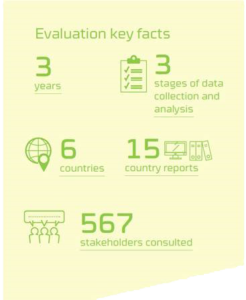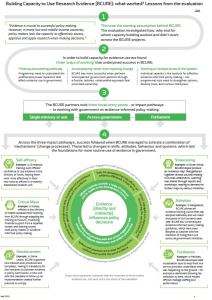The £15.7 million BCURE programme aimed to improve the use of evidence in decision making in low and middle-income countries. It ran from 2013 to 2017, funded by DFID (the UK Department for International Development), and was made up of six linked projects implemented across 12 countries in Africa and Asia, as well as a number of additional countries reached through international networking and small-grant initiatives. Each project used different combinations of capacity develop ment interventions to support policymakers, government officials and parliamentarians to develop skills, knowledge and systems in order to improve the use of evidence in decision making.
ment interventions to support policymakers, government officials and parliamentarians to develop skills, knowledge and systems in order to improve the use of evidence in decision making.
The BCURE evaluation was conducted by an independent evaluation team from Itad, and ran from 2014 to 2017, in parallel with the programme. The evaluation had a focus on both learning and accountability, as expressed in its two key aims:
- To strengthen the global evidence base on the effectiveness of capacity building approaches to support evidence-informed policy.
- To evaluate the effectiveness and value for money of the six BCURE programmes.
The evaluation encompassed annual internal programme evaluations of the six BCURE programmes, a literature review, an impact case study of a non-BCURE capacity building initiative, and annual synthesis reports on how and why capacity building for evidence use works or not in different contexts. This final report summarises insights from across all of these components.
Resources
Check out publications and findings from BCURE below.
 Final evaluation of the Building Capacity to Use Research Evidence programme
Final evaluation of the Building Capacity to Use Research Evidence programme
- Read the full report
- Read the Executive Summary
- Read our blog summary of the evaluation headlines
Academic Publications
- Pre-print version – Keeping it real: using mechanisms to promote use in the realist evaluation of the Building Capacity to Use Research Evidence Program, New Directions for Evaluation, Volume 2020, Issue 167
- Lessons from the completed evaluation are also included in a later CDI practice paper published in 2020, discussing challenges and lessons on using realist evaluation in complex programmes: ‘Reality Bites: Making Realist Evaluation Useful in the Real World’
- Lessons from the first year of the BCURE Evaluation are reflected in a 2016 CDI Practice Paper ‘Reflections from a Realist Evaluation in Progress: Scaling Ladders and Stitching Theory’.
Literature Review: How can capacity development promote evidence-informed policy making?
The literature review examines how and why different approaches to capacity building for evidence-informed policy making work, for whom, and in which contexts.
- Read the full Literature Review
You can read the Literature Review in sections:
- Section 1 – What is ‘building capacity for evidence-informed policy making’?
- Section 2 – What factors promote and constrain evidence-informed policy making?
- Section 3 – What is the evidence on how to build capacity for evidence-informed policy making?
Read the Literature Review Briefing Note for an overview of three of the main lessons.
You can also explore the BCURE Literature Database (XLSX File, Size: 186 KB), which includes information on all the resources used, as well as other useful resources which didn’t make it into the review.
Stage Two Synthesis Report
Stage One Synthesis Report
- BCURE Evaluation Stage 1 Synthesis Report
- Stage 1 Synthesis Report Briefing Note – Why don’t decision makers use evidence, and what can be done about it?
For more information on the BCURE project please visit the BCURE website.
Contact Rob Lloyd (rob.lloyd@itad.com) if you would like to discuss this project.
Image © School for the first time. Photo credit: DFID (CC BY 2.0)


